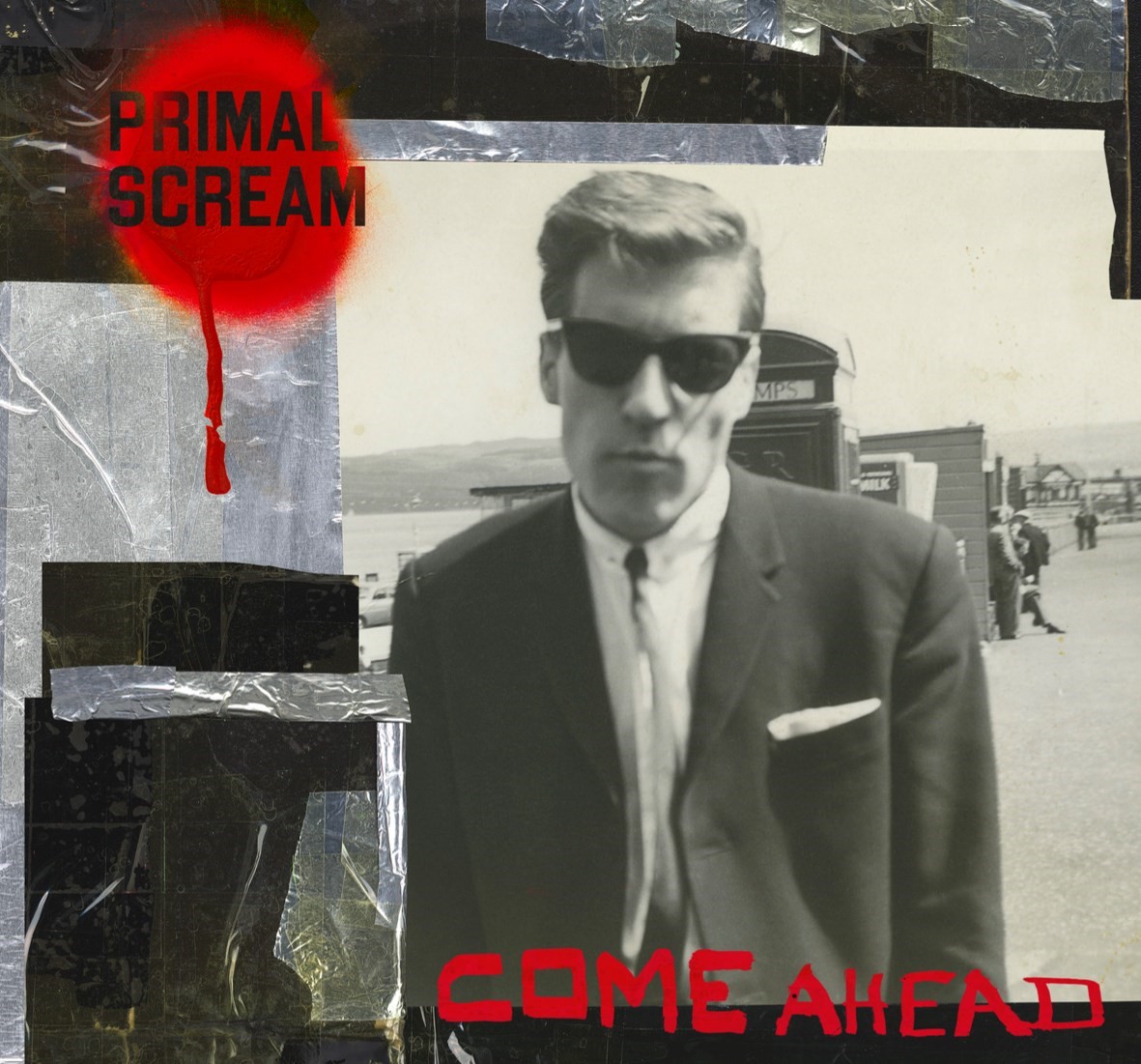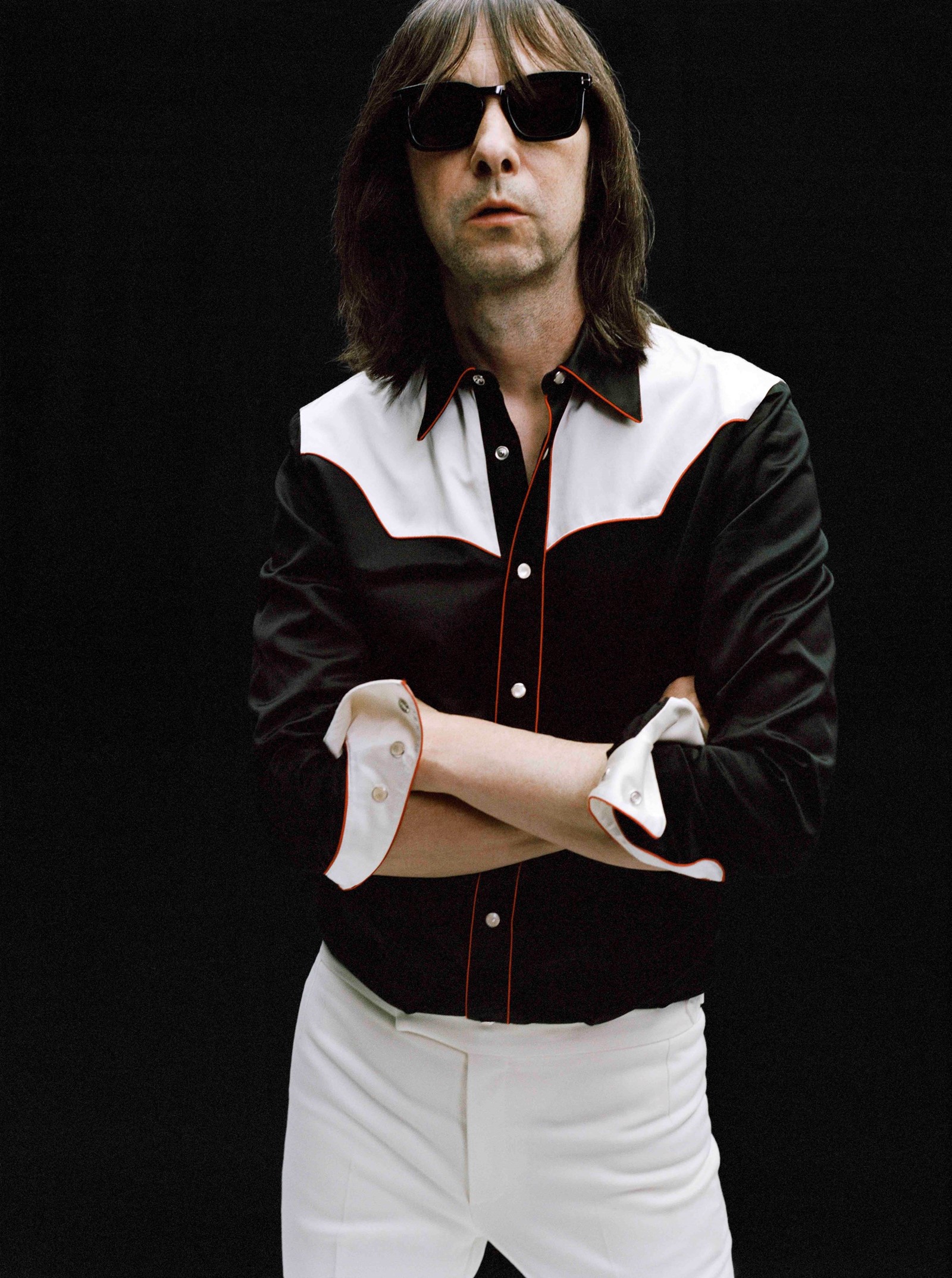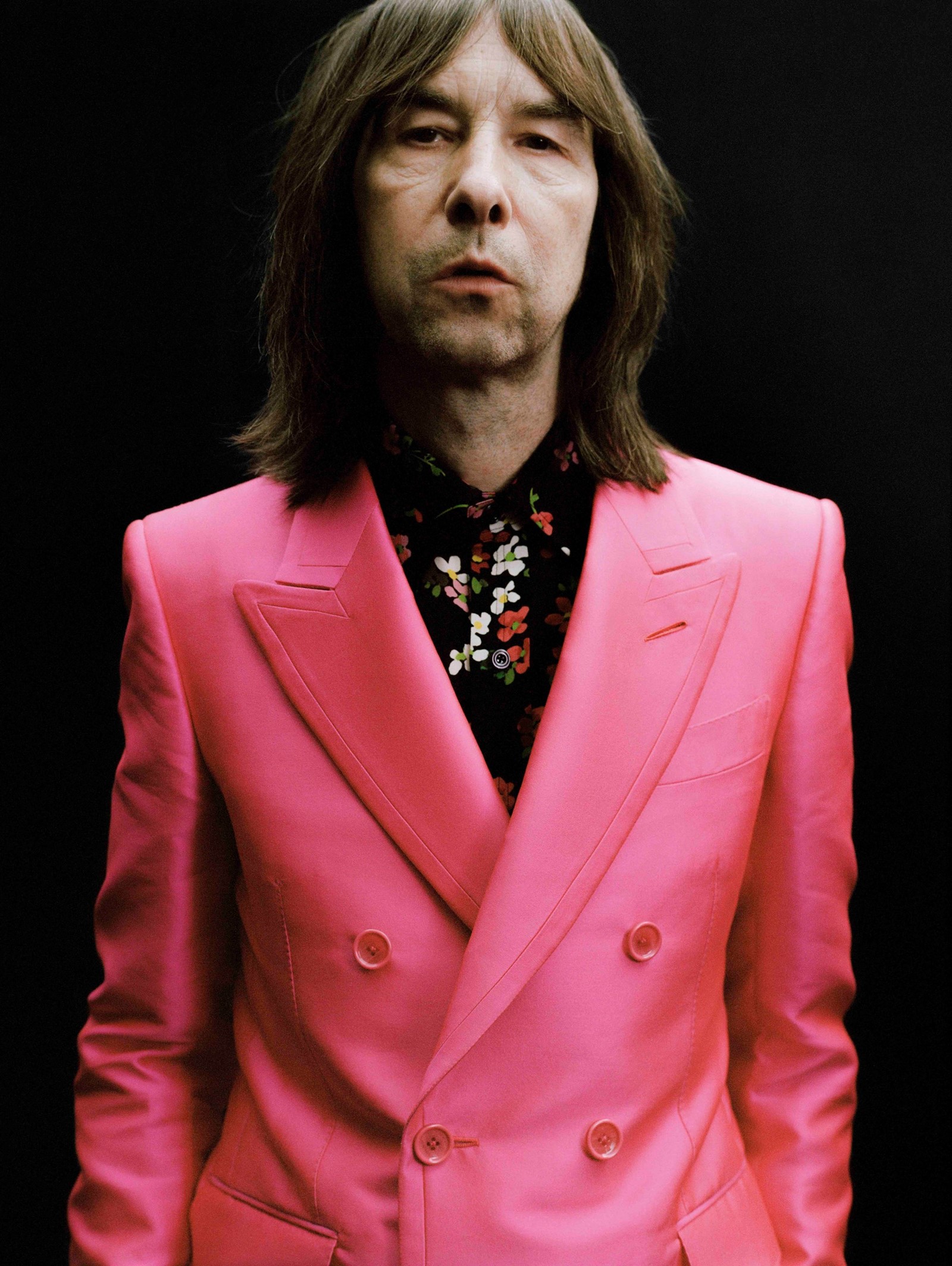Sometimes even rock stars have to pause an interview to drop off some frozen dog food. But then, if there was ever a music icon who never strayed far from his less glamorous roots, it was Bobby Gillespie. Nipping into his house mid-question about Primal Scream’s new album, Come Ahead, he shouts instructions for anyone within earshot to feed the family’s two Staffies, who apparently like their dinners raw. “Just like the MC5,” he says. “Their girlfriends used to serve them raw meat like Vikings.”
Produced by David Holmes, the 11 psychedelic funk-heavy tracks on the band’s first album since 2016’s Chaosmosis represent the latest in a slew of recent creative projects for Gillespie, from his memoir and duets with Jehnny Beth to a soundtrack for French filmmaker Émilie Deleuze. Shot through with a Glaswegian working-class attitude, Come Ahead rages against social injustice, yet, via some shamanic alchemy, can transform the heaviest of subjects into joyous soul-shaking music. Punk protest is in Gillespie’s blood.
“There’s no rebellion in rock music anymore. It’s a business, a Walt Disney fucking dream world. Just another part of the entertainment industrial complex,” says Gillespie. “But there are still a few good people kicking against the pricks out there.”
Answering 50 questions from the comfort of his car he talks about pinching clothes off his skinny-hipped sons Wolf and Lux, the illusion of democracy, and the influence of his late father, who is immortalised on the album cover. “He loved it when we rocked it up a bit, so dad would have liked this record,” he says. “Listen, if you can’t dance to it, it’s not rock ‘n’ roll.”

1. Thanks for finding time to speak to us, Bobby. How are you doing? Thanks for wanting to talk to me. I’m good.
2. Where are you right now? Stuck in traffic on my way home.
3. The title of the new album, Come Ahead, is rooted in Glaswegian. What do you miss most about your hometown? It would be easier to tell you what I don’t miss about it!
4. You’ve said the album has an attitude that in Glasgow you call ‘gallus’. What does it mean? Gallus is when somebody has a swagger, an aggressive confidence about them.
5. How has Glasgow changed from the place where you grew up? The spirit of the people remains intact but architecturally it’s changing. I’m being nostalgic, but it’s a comfort that there are still so many beautiful old buildings left.
6. Is your childhood home still standing? The Springburn tenements I lived in before I was ten were demolished in 1971, but our council flat in Mount Florida on the south side of the city is still there.
7. What’s the first thing you do when you go back? Call my mum and arrange to meet her for dinner.
8. How important is family to you? Family is the most important thing to me.
9. Can you remember your first Celtic game? It would’ve been the Scottish Cup final against Hibs at Hampden Park in 1972. They used to open the gates for the last 20 minutes so the kids could get in free.
10. Living in London, how do your sons stay in touch with their Scottish roots? They’re both Celtic fanatics and are really close to my mum. Also, their nanny when they were children was an old punk friend from home. She moved back up but sends them Glaswegian delicacies, like Scotch pies, square sausage, and tablet (a hard fudge made with condensed milk).
Are there any themes that tie the album together? “Conflict. Probably because the world is permanently on fire” – Bobby Gillespie
11. Do they know the posh Scottish cafe serving up square sausage rolls in Islington? They told me about that place. I think it’s good fun, people queuing up for it.
12. What did it mean to use a picture of your late father on the cover of the new album? It represents a lot of things I hold dear. It represents a Glaswegian attitude, a working-class attitude, and a rock ‘n’ roll attitude.
13. What do you love most about the photograph? First, he looks cool as hell, he looks hard as fuck, and he looks ultra stylish. It goes perfectly with the title Come Ahead, you know? It looks gallus.
14. You recorded the album between Belfast, London and Los Angeles. Where are you happiest working? Anywhere I’ve got a good idea and a good song, and the musicianship is of a high standard. Anywhere good things are played and made. I can make records anywhere.
15. Didn’t Primal Scream have a little garage studio in Primrose Hill for a while? We made most of our albums from 1996 to 2012 there, it was primitive, but we had great musicians come, guys from the Sun Ra Arkestra, Bernard Sumner from New Order, Augustus Pablo, Can.
16. What inspired you to start writing Primal Scream music again this time around? I never stopped, that’s the thing. When I recorded Utopian Ashes with Jehnny Beth, most of the guys in the band played on it too, so it could have just as easily been a Primal Scream album.
17. What other kinds of projects have you been busy with? I haven’t stopped working since Chaosmosis, whenever that was.
18. How different was writing your book, Tenement Kid, to the usual songwriting process? It’s completely different because you’ve got more space to talk about what you want to talk about. With the pop-rock song format, you get two verses, a bridge, and a chorus, three minutes, 20 seconds. You’re very limited.
19. Primal Scream tracks have often been much longer than that though? But we’ve always had to edit them for radio, because of the commercial market’s short attention span. Although on this album, there are tracks like Settlers Blues that have 16 verses. Sometimes I need to say what I need to say.
20. Has writing the book had an influence on your songwriting? It’s given me more confidence. I’ve realised that long-form suits me. I can write without limiting myself, and the music benefits from that.

21. And has it had an impact on how the new album came together? From Screamadelica to Give Out But Don’t Give Up, Robert Young, Andrew Innes and I wrote the songs. Then from 1996 onwards, it was just me and Andrew in the studio getting ideas down. By the last album, we’d exhausted that style of writing. Instead of jamming I worked on the acoustic guitar at home alone.
22. It sounds like you didn’t really have plans for another Primal Scream album at all? After taking a year off to write the book I knew I had to have a rethink, but in one way or another I had the lyrics for Come Ahead written, I just didn’t know what to do with them.
23. Almost as if Tenement Kid and Utopian Ashes unlocked something in you? Whole songs would come to me. I wrote all 16 verses of Settlers Blues in a day and a half. Ready to Go Home and Deep Dark Waters came in one go. I think those projects freed something in me or unchained me somehow. Best not to question it too much, you know?
24. What did working with producer David Holmes bring to the album? A hell of a lot. This record would never have happened without him.
25. How come? He was the one who called me to say we had to do something about Tory corruption. Brexit had opened his political conscience, and this was post-lockdown when the government’s mask had slipped, and everyone could see the slug-infested face beneath.
26. How did that first call materialise into Come Ahead? A year later he emailed me this really dirty, funky groove. I got my guitar and the lyrics for Ready to Go Home out, which I’d written as a gospel track, and adapted it to the new rhythm. Next, he sent me a big beat, Philadelphia disco groove, in case I had a song that could work with that.
27. And the rest is history? He sent me a message saying ‘Congratulations, you just started the Primal Scream album!’
28. Are there any themes that tie the album together? Conflict. Probably because the world is permanently on fire.
29. How does that come through in the music? Settlers Blues is about victims becoming the victimisers, basically what’s happening in Gaza. Then Circus of Life is this story of an alcoholic going through hell, in conflict with themselves and the world. But I guess Ready to Go Home, being about finding peace, is actually like an end to conflict. So, there is hope!
30. What makes you feel most conflicted? Getting out of bed. My parents were both very hardworking, but I have a more bohemian approach. Before I met my wife (stylist Katy England), I’d go to bed at four or five in the morning, and if I was up before 12, I thought I was doing all right.
“In 1999 I wrote a song about a military-industrial illusion of democracy called Swastika Eyes and it’s just that. The US is a one-party state. Democrats and Republicans are two sides of the same neoliberal coin. No matter who wins, they’re all bastards” – Bobby Gillespie
31. I guess the late nights and having a family don’t mix? It goes against all Katy’s ethics. When we met, she was up at eight, at Alexander McQueen for nine and doing a full day before going to work at Dazed & Confused then getting home and straight into bed by ten. I was like, what’s wrong with this girl? I thought we’d be up partying all night!
32. It comes with the territory though, being in a band? I was brought up to get out of bed early for school, or to clock in at work. The whole idea of being an artist for me was to break free of the structures of the straight world and live as you pleased. I’m not lazy, and I know I’m privileged, but what can I say? It’s like living the life of a bourgeoisie.
33. What keeps you going when humanity shows the worst of its nature? Knowing there are leaders like Mick Lynch, Jeremy Corbyn, and John McDonnell out there. True patriots who want the best for the country by fighting exploitation and raising people up with better working conditions and wages.
34. Is it harder to find hope with so much horror happening elsewhere in the world? It’s like we’re live-streaming genocide and in some ways. I want to see the badness because it shows the true face of our governments and how they’ve abandoned the Palestinian people. Their resistance to occupation is completely inspiring.
35. I take it you’re not expecting much from the upcoming US elections then? In 1999 I wrote a song about a military-industrial illusion of democracy called Swastika Eyes and it’s just that. The US is a one-party state. Democrats and Republicans are two sides of the same neoliberal coin. No matter who wins, they’re all bastards.
36. Are things any better here? Just the same. Both parties work for big business and the state against the people of the fucking country.
37. Where do you even start turning these heavy subjects into such joyous sounding music? My heroes are Peter Tosh, John Lennon, Curtis Mayfield, and The Clash, who all raged against the injustices of the world. They made beautiful, uplifting, high energy soul music that touches the heart and gets the feet moving. Primal Scream is firmly in that tradition.
38. With that in mind, how does Come Ahead differ from previous Primal Scream albums? You can hear the confidence that comes with years of writing, recording and playing live. The songwriting and lyrics are better, and we’ve arrived somewhere through working with David.
39. If you could have been at any gig in history, what would it be? There were shows in Detroit in the late 1960s with the Sun Ra Arkestra, MC5, and The Stooges on the same bill, that would have been good. [Bob] Dylan at the Royal Albert Hall. Or the Stones at Altamont, dressed like a Hells Angel, holding a pool cue.
40. Which has been Primal Scream’s best performance to date? Glastonbury 2003 was really good, but Glastonbury 2005 was even better – that was when we got thrown off stage.
41. Who have you seen perform recently that really excited you? I just saw The Pretenders and that was a masterclass. Chrissie Hynde is like The Ronettes or Shangri-Las with an electric guitar. She’s a street punk chanteuse.
42. What does the spirit of rock ‘n’ roll mean to you? Sid Vicious on stage in Texas with a bloody nose and ‘gimme a fix’ carved into his chest, swinging his bass guitar into the face of a heckler while shouting ‘All cowboys are faggots!’. You don’t see that anymore.
43. Drumming for The Jesus and Mary Chain, did you ever get caught in the middle of Jim and William Reid during one of their infamous fights? No, it was always just between them. I’ve got a brother myself so I know what’s it like, it must be hell to be in the same band. Mine was a roadie for us in the late 80s and that was bad enough.
44. Was it any easier working with your old school friend Alan McGee in the Creation Records days? Our relationship changed but I love McGee, he’s brilliant. There are very few managers as outrageous or outspoken. He’s in that lineage of Tony Wilson and Malcolm McLaren.
45. Who makes your suits? I’ve worn Alexander McQueen for years. The suit I got married in was McQueen, when Lee was still alive. Then of course Celine – Hedi’s left but right now I’m wearing a beautiful shirt he gave me. And I’ve just started talking to my tailor Ritchie Charlton about clothes for the next tour.
46. Do your sons ever steal your clothes? Yeah, they’re slim lads, I think Lux is a 28” waist, so they’ve been seen out in my clothes. Which is okay, up to a point.
47. And do you ever steal theirs? Wolf had this great corduroy Supreme jacket that looked like something River Phoenix wore in My Own Private Idaho. I nicked that a few times, aye.
48. How much are you looking forward to being on tour again? Can’t wait. We’ve got an album of great songs, and I want to play as many as I can. To remain relevant, you have to write songs that relate to life today. Nostalgia is a nice, easy, safe place, but you don’t want to live there all the time. It’s a trap.
49. What has music given you? The chance to be an artist, to express myself, and a career in the creative arts that I never would have had. I discovered that I could be a creative person through punk rock music. Without that, I’d still be working in the print factory.
50. And finally, Bobby, how would you rate this interview? Oh, ten out of ten. You’re a great guy and I’m a great guy too. Cheers.
Come Ahead by Primal Scream is released via BMG, and is out on November 8.
